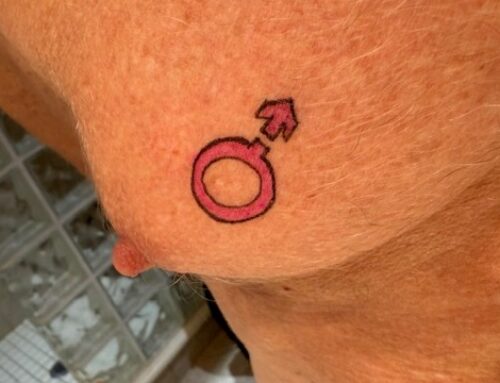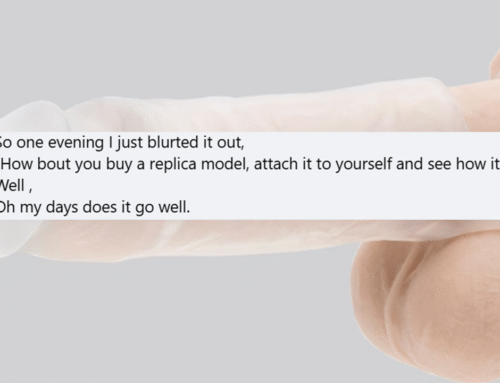For ten years, women have benefited from the wisdom and ground-breaking research contained in Emily Nagoski’s New York Time bestseller Come As You Are. Now it is time for men – especially those with erectile differences – to learn parallel lessons. As Nagoski says
What I need is to hear that it is okay to feel sad that my body will never be what is used to be. I put a lot of effort into learning to love that body, and now I have got to start all over again learning to love this one.
It’s tough to learn to love your new body when you feel disappointed in it. Read on to get a bit of support for the mental and physical shifting of gears this entails.
Our bodies don’t always follow the standard sexual narrative
Most of us grow up burdened with a standard sexual narrative that can be stifling. Nagoski says
Your sexual response may not follow the ‘standard narrative’ of sexual functioning:
• You may have more or less sensitive brakes and a more or less sensitive accelerator.
• Your genital response may not predict your subjective experience of being ‘turned on.’
• Your sexual desire may emerge in response to pleasure, rather than in anticipation of pleasure.
All of which may come as a surprise
She points out that about half of all men experience sexual patterns that conform to what she calls the standard narrative. In summary: there are few brakes on sexual appetite. You experience spontaneous arousal and sexual desire. And your genitals respond in concordance with your mental arousal. This pattern fits less than one fifth of all women. Her 2015 book primarily addresses the majority of women whose sexuality doesn’t fit that standard narrative. It’s a wonderful book! While it was a major indirect influence on my own work, I hadn’t actually read it until this month.
I just finished reading Come As You Are and found it was extremely relevant to me as a man. I think it deserves much wider attention from men who don’t fit the standard narrative. Welcome to the new normal where
- Our libidos might no longer be as “always on” as they were, or as men are portrayed in the mainstream.
- Our erectile differences can confuse us and our partners. Sexual interest may or may not be accompanied by firm erections.
- We often take a lot longer to get going, sexually speaking. Our sexual energy may only perk up in response to pleasurable situations, rather than driving us into those situations.
How sexual expectations are built into standard culture
Popular author Alain de Botton wrote in How to think more about sex, published just three years before Come As You Are, as if “the body cannot lie” in a way that Nagoski unmasks as false. He describes lubricating vaginas and tumescent penises as “unambiguous agents of sincerity,” but Nagoski’s data shows this is not true for many men and an even bigger proportion of women. The male part of the data aligns with the research I did for my book.
Nagoski points out that when we say “I’m so wet” or “I’m so hard” we mean “I am into this.” Porn, erotica and many lover’s conversations are riddled with these standard markers. But they are sometimes only metaphors. There is no shame in being dry and/or soft and still wanting to be sexual.
As Nagoski points out “these metaphors are so entrenched that people believe they are literal.” This tends to disempower ordinary people from making practical adjustments to their sex lives. For example, you can use lube to address dryness during sex, or the techniques of Chapter 3 (Pleasure) in Beyond Erections to make love without a firm erection.
Orgasms vary far more than most people acknowledge
Nagoski noted in 2015 that for women
orgasms feel different to everyone and orgasms can vary from each other, depending on the mode of stimulation, whether you have a partner with you, maybe even where you are on your menstrual cycle – any number of factors. Sometimes you feel a rhythmic pulsing around your vagina, sometimes not. The main thing most women describe most of the time is a sense of “doneness,” a sense that you’ve crossed a threshold and something has completed.
Men can also experience a wide variety of orgasmic sensations. Orgasms do not require ejaculation. They don’t require erections. And orgasmic satisfaction for penis owners doesn’t even require rhythmic pulsing of the penis. People can experience ecstatic orgasmic sensations across their entire bodies including but not limited to penises that might be soft or hard, dry or ejaculatory. And pulsation might be in the genitals, or thighs and bellies, or whole bodies with or without classic penile orgasms.
This subject is explored in much more depth in Chapter 4 of Beyond Erections, entitled Satisfaction. For a more poetic take, see Nin Andrews in the Infinite variety of orgasms.
New patterns of thinking, relating and sexual behaviour take time to explore. Why not make a start now?
Related post
For a first-hand direct experience of a man remaining sexual while on ADT, partly inspired by this book, please see Reaching through the glass wall: sexual pleasure on ADT and estradiol.
Discover more from Beyond Erections
Subscribe to get the latest posts sent to your email.
One Comment
Please share your candid and personal comments
Recent comments
Related Posts
Discover more from Beyond Erections
Subscribe to get the latest posts sent to your email.









Mish, I’m so glad you enjoyed E.N.’s book, as I did. Although seemingly aimed at women there is so much that men can take away from it. How did you like the bit on the importance of “context” in a loving relationship? That has been my main take away and resonance.
I’m a bit different than you in that I’m on androgen deprivation (doublet) probably for life. I’ve found ACT theory to help me move toward my values – of which my sexuality is most important. I envy you your testosterone and would do anything possible to get it back, but when I’m where I want to be mentally, I can see how I’ve changed for the better.
I find, I do in fact, still feel quite sexual. I can still orgasm. I have intimate relations with my beautiful wife and am more interested in her as a person and in our loving relationship than prior to treatment (16 mo.)
I’m currently reading “Desire” (2023) by Lauren Mersy and Jennifer Vencill. I’m halfway through and am enjoying it very very much. Later, Tim